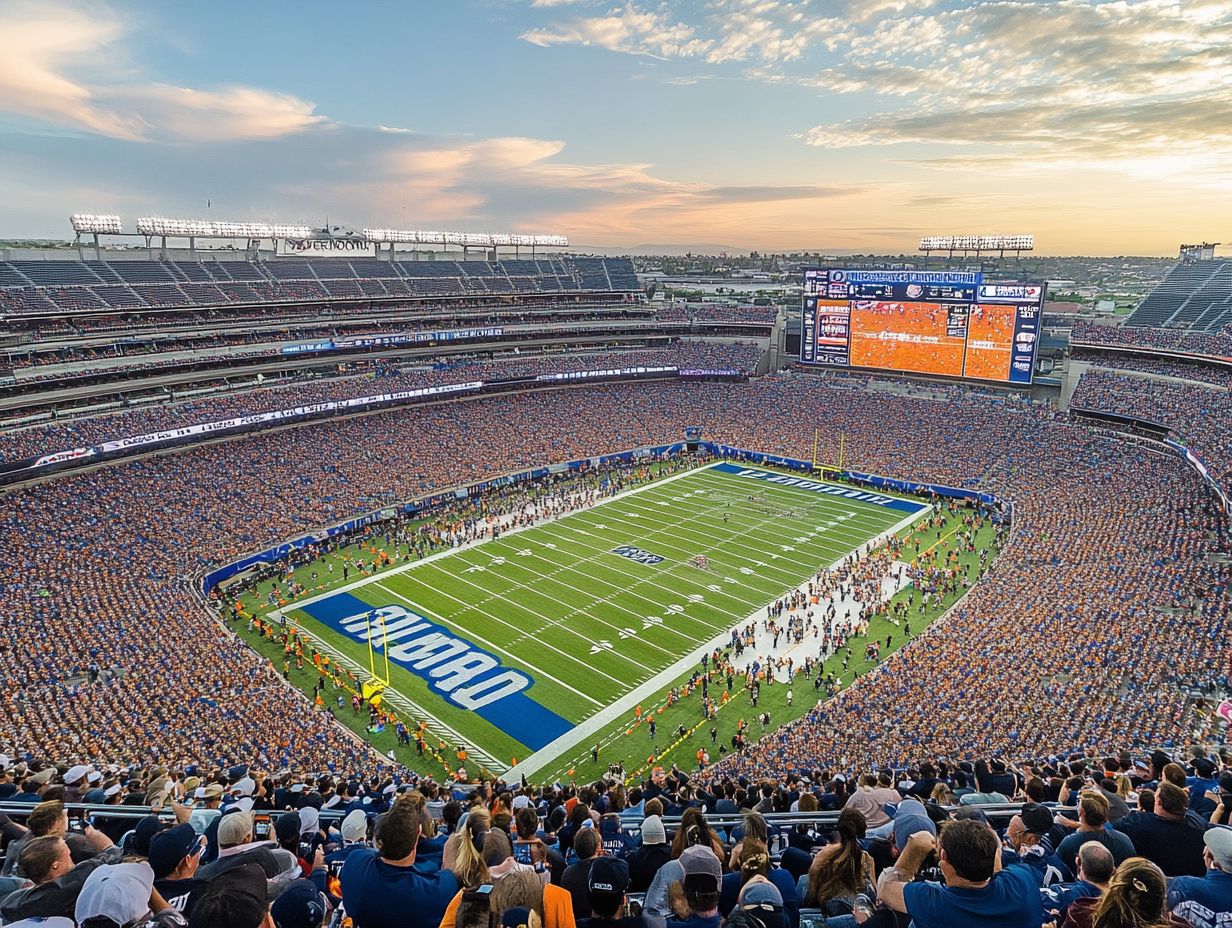In the current fast-paced digital landscape, mobile data has emerged as a transformative element for stadiums, providing significant opportunities to enhance the fan experience and drive revenue. This article examines the importance of mobile data, emphasizing its capacity to link sponsorships with consumer behavior patterns. By leveraging these insights, stadiums can unlock new revenue streams and deepen fan engagement. Additionally, practical recommendations for the effective implementation of mobile data strategies will be provided, ensuring that your stadium maximizes its potential.
Explanation of Mobile Data and Its Importance for Stadiums: Data-Driven Decisions and Fan Engagement
Mobile data has become an essential asset for stadiums, greatly enhancing fan engagement, optimizing venue management, and driving revenue generation through data-driven strategies, including predictive analytics and behavior analysis.
With the widespread adoption of mobile applications and connectivity, stadiums can utilize real-time analytics to gain insights into attendee behavior, refine customer understanding, and customize their offerings to align with the evolving expectations of fans. The integration of mobile data enables stadiums to implement targeted advertising and improve ticket sales by analyzing fan demographics and behavior patterns, thus ensuring an immersive and engaging experience during events.
This extensive dataset encompasses not only attendance figures but also critical aspects such as in-stadium spending habits, concession preferences, and social media interactions. By leveraging this information, venue managers can craft personalized experiences that resonate with fans, thereby fostering loyalty and enhancing overall satisfaction.
Moreover, mobile connectivity paves the way for dynamic sponsorship opportunities, allowing brands to engage directly with fans during events through interactive promotions delivered via smartphone applications. Consequently, the strategic utilization of mobile data not only elevates the in-stadium experience but also enhances overall operational efficiency, positioning venues to swiftly adapt to trends and thrive in an increasingly competitive entertainment landscape.
Benefits of Connecting Sponsorships, Behavior Patterns, and Market Research

Establishing a connection between sponsorships and consumer behavior patterns provides significant advantages for both stadiums and sponsors, such as heightened fan engagement and enhanced advertising efficacy. Effective use of market research and digital advertising techniques plays a crucial role in this process.
By gaining insights into consumer behavior and audience preferences, stadiums can develop sponsorship activation strategies that resonate more profoundly with fans, resulting in increased sponsorship revenue and strengthened brand loyalty. This involves the use of detailed demographic profiling and audience behavior tracking.
This strategic alignment facilitates more effective cross-channel marketing campaigns, employing data-driven approaches to target specific audience segments and elevate overall consumer engagement during events. Utilizing sports marketing and mobile marketing strategies can significantly enhance these efforts.
Increase in Revenue and Fan Engagement through Data Analytics and Mobile Solutions

By leveraging data analytics to enhance the understanding of fan engagement, stadiums can significantly increase revenue through targeted sponsorship opportunities and optimized event attendance strategies. Engaging fans through personalized experiences not only boosts sales but also cultivates brand loyalty and encourages repeat attendance at events.
The utilization of metrics, such as engagement metrics and marketing return on investment (ROI), allows stadiums to refine their marketing campaigns, ensuring they resonate with their audiences and ultimately contribute to higher revenue streams. Employing marketing automation and mobile engagement strategies can optimize these campaigns.
Successful campaigns, such as social media contests or interactive pre-game events, have demonstrated the ability to draw larger crowds and attract lucrative sponsorships, as brands observe increased visibility within devoted fanbases. Using social media engagement and real-time insights can drive these successful outcomes.
By analyzing audience insights, venues can tailor their offerings, including exclusive food selections or VIP experiences, to align with fan preferences, thereby driving ticket sales and enhancing overall satisfaction. Implementing venue optimization and interactive experiences can further improve fan experience.
Furthermore, the implementation of loyalty programs that reward frequent attendees can foster strong community bonds, motivating fans to actively participate. This engagement can subsequently lead to premium advertising deals and long-term partnerships with companies seeking to connect with these engaged demographics.
How to Utilize Mobile Data for Sponsorship Opportunities: Maximizing Sponsorship Effectiveness

Utilizing mobile data for sponsorship opportunities represents a significant advancement for stadiums, enabling precise audience targeting and enhancing the overall sponsorship landscape. Employing mobile trends and technology integration can further enhance these opportunities.
By analyzing data analytics related to fan demographics and behavior patterns, stadiums can identify key sponsorship opportunities that align with the interests and preferences of their audience. This includes leveraging event analytics and fan-driven data for more accurate targeting.
This targeted approach not only increases the effectiveness of advertising but also strengthens the partnerships between stadiums and sponsors, leading to mutually beneficial outcomes. Utilizing mobile user engagement and behavioral data can improve these partnerships.
Identifying Behavior Patterns and Targeting Sponsorship Deals: Leveraging Behavioral Insights
Identifying behavior patterns among fans is essential for establishing effective sponsorship deals, as it allows stadiums to align their offerings with consumer preferences. By employing audience segmentation and analyzing fan feedback, stadiums can tailor their sponsorship strategies to meet the specific needs of different demographics and behavioral trends, thus enhancing the overall effectiveness of targeted advertising initiatives. This method ensures that sponsors engage with the appropriate audience, resulting in improved engagement metrics and a higher return on investment.
To accomplish this, stadiums often utilize advanced data analytics tools to monitor fan interactions and purchasing behaviors, providing a more nuanced understanding of diverse consumer segments. Techniques such as surveys, social media monitoring, and mobile app analytics yield critical insights into fan preferences and tendencies.
For example, a notable case study involved a leading sports venue that implemented targeted marketing campaigns based on audience insights, which resulted in increased sponsor brand relevance and sales. By focusing on consumer behavior, stadiums not only optimize their sponsorship agreements but also create a more engaging experience for fans.
Practical Tips for Implementing Mobile Data in Stadiums: Ensuring Data Privacy and User Experience
The implementation of mobile data in stadiums necessitates a strategic approach to ensure successful integration and to maximize its benefits while addressing potential challenges. Prioritizing data privacy and user experience is crucial for achieving optimal results.
Best practices involve the establishment of robust mobile engagement strategies that prioritize user experience and data privacy. Furthermore, leveraging real-time analytics and fostering data collaboration across various departments within the venue can optimize operations and enhance the overall customer experience during events.
Best Practices and Potential Challenges: Addressing Data Integration and Mobile User Engagement
Adopting best practices for mobile data utilization in stadiums necessitates a comprehensive understanding of potential challenges related to data integration and audience engagement. Ensuring seamless mobile user engagement and addressing mobile technology adoption issues are key considerations.
Successful implementation of mobile applications hinges on the continuous enhancement of user experience and the active monitoring of fan feedback to ensure that strategies effectively address their needs. Furthermore, embracing sports analytics can yield actionable insights that enable stadiums to optimize their offerings and enhance overall fan satisfaction.
Integrating robust user interfaces that accommodate varying levels of technological proficiency among fans can significantly increase interaction. Additionally, it is crucial to address common obstacles, such as inconsistent Wi-Fi coverage and the imperative of ensuring data privacy.
Providing dedicated support and resources can alleviate these concerns, thereby enhancing trust and promoting engagement. Utilizing insights gained from mobile analytics can guide the development of tailored promotions, contributing to the creation of memorable experiences that resonate with attendees.
Ultimately, a focus on innovative solutions can effectively bridge the gap between data complexity and user-friendly engagement. Using engagement platforms and mobile solutions can streamline this process.







